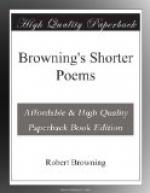46. =Malouins=. Inhabitants of St. Malo.
135. =The Louvre=. The great palace and art gallery of Paris.
Note the suggestion of the sea, and of eager hurry, in the movement of the verse. Compare the directness of the opening with that of the preceding poem: What is the advantage of such a beginning? How much is told of the hero? By what means is his heroism emphasized? How is Browning’s departure from the legend a gain? Observe the abrupt energy of lines 39-40; the repetition, in 79-80; the picture of Herve Riel in stanzas viii and x.
PHEIDIPPIDES. (PAGE 30.)
The story is from Herodotus, told there in the third person. See Herodotus, VI., 105-106. The final incident and the reward asked by the runner are Browning’s addition.
[Greek: =Chairete, nikomen=]. Rejoice, we conquer.
4. =Zeus=. The chief of the Greek gods (Roman Jupiter). =Her of the aegis and spear=. These were the emblems of Athena (Roman Minerva), the goddess of wisdom and of warfare.
5. =Ye of the bow and the buskin=. Apollo and Diana.
8. =Pan=. The god of nature, of the fields and their fruits.
9. =Archons=. Rulers. =tettix=, the grasshopper, whose image symbolized old age, and was worn by the senators of Athens. See the myth of Tithonus and Tennyson’s poem of that name.
13. =Persia= attempted a conquest of Athens in 490 B.C. and was defeated by the Athenians in the famous battle of Marathon, under Miltiades.
18. To bring earth and water to an invading enemy was a symbol of submission.
19. =Eretria=. A city on the island of Eub[oe]a, twenty-nine miles north of Athens.
20. =Hellas=. The Greek name for Greece.
21. The Greeks of the various provinces long regarded themselves as of one blood and quality, superior to the outer barbarians.
32. =Phoibos=, or Ph[oe]bus. Apollo, god of the sun and the arts. =Artemis= (Roman Diana), goddess of the moon and patroness of hunting.
33. =Olumpos=. Olympus. A mountain of Greece which was the abode of Zeus and the other gods.
52. =Parnes=. A mountain on the ridge between Attica and B[oe]otia, now called Ozia.
62. =Erebos=. The lower world; the place of night and the dead.
80. =Miltiades= (?-489 B.C.). The Greek general who won the victory over the Persians at Marathon in 490 B.C.
106. =Akropolis=. The citadel of Athens, where stood the court of justice and the temple of the goddess Athene.
109. =Fennel-field=. The Greek name for fennel was [Greek: ho Marathon] (Marathon). Hence the prophetic significance of Pan’s gift to the runner.
Compare the story in Herodotus (VI., 105-106) with Browning’s more spirited and poetic version. Observe how the strong patriotism, the Greek love of nature, and the Greek reverence for the gods are brought to the fore. What imagery in the poem is especially effective? What is the claim of Pheidippides—as Browning presents him—to memory as a hero? What ideals are most prominent in the poem?




